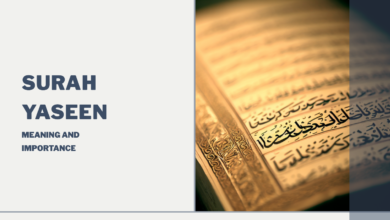
Introduction of What is Hell in Islam
In Islamic belief, the concept of Hell plays a significant role in shaping the understanding of the afterlife. As an essential component of the Islamic eschatological framework, Hell serves as a stark reminder of the consequences of one’s actions in the mortal realm. While the Islamic perspective on Hell shares some commonalities with other religious traditions, it is uniquely characterized by its vivid descriptions and the underlying emphasis on divine justice. This article aims to explore the concept of Hell in Islam, its portrayal in the Qur’an, its purpose, and the Islamic perspective on salvation and repentance.
The Nature of Hell in Islam
In Islam, Hell is referred to as “Jahannam,” a place of torment and punishment for those who have committed grave sins and transgressions against God’s commands. It is depicted as a physical and spiritual realm of intense suffering, anguish, and despair, wherein the souls of the damned are confined.
The Qur’an provides detailed descriptions of Hell, illustrating it as an inferno with seven levels, each more severe than the preceding one. These levels are believed to reflect the degrees of wickedness and the intensity of punishment corresponding to an individual’s sins.
The Role of Hell in Islamic Theology
The concept of Hell serves several crucial purposes in Islamic theology:
- Moral Guidance: The prospect of Hell serves as a potent deterrent against committing sinful acts. Believers are urged to lead righteous lives and follow God’s commandments to avoid eternal damnation.
- Divine Justice: Hell represents God’s justice, wherein all actions, both good and evil, will be accounted for on the Day of Judgment. Those who have caused harm to others or disobeyed God’s laws will face retribution commensurate with their deeds.
- Appreciation of Paradise: The vivid depiction of Hell in Islamic teachings highlights the stark contrast with Paradise (Jannah), emphasizing the eternal reward awaiting those who faithfully serve and worship Allah.
Sins and Punishments
Islam categorizes sins into major (Kabirah) and minor (Saghirah) sins. Major sins are those of a more severe nature and are met with more severe punishments. Some of the major sins that can lead to Hellfire include idolatry (Shirk), murder, adultery, usury (riba), and the consumption of alcohol or intoxicants.
The punishments in Hell are multifaceted, designed to match the nature of the sins committed. The Qur’an often describes the inhabitants of Hell enduring painful chastisements such as burning in scorching flames, drinking boiling water, and wearing garments of molten copper.
The Opportunity for Repentance
Despite the severity of Hell’s punishments, Islam places immense emphasis on the concept of repentance (Tawbah). The door to forgiveness and redemption is open for all during their lifetimes. If an individual genuinely regrets their sins, seeks forgiveness from Allah, and resolves not to repeat the transgressions, they can attain absolution.
The Qur’an assures that Allah is the Most Merciful and the Most Forgiving, always ready to accept the repentance of those who turn to Him sincerely. This aspect of Islamic belief offers hope and encourages believers to seek redemption, no matter the gravity of their past deeds.
Hell as a Means of Mercy
Paradoxically, the existence of Hell is often viewed as a manifestation of Allah’s mercy. Islamic scholars argue that the knowledge of Hell’s consequences is meant to guide humanity away from evil deeds and towards a righteous path. In this sense, Hell serves as a compassionate warning and an opportunity for humans to make amends, seek forgiveness, and ultimately earn salvation.
The Role of Good Deeds and Salvation
Islamic teachings emphasize the balance between faith and good deeds as essential components for salvation. While faith is paramount, it must be accompanied by righteous actions that reflect one’s commitment to serving Allah and treating others with kindness and compassion.
Believers are encouraged to perform acts of charity (Sadaqah), engage in prayer (Salah), fast during Ramadan (Sawm), and undertake the pilgrimage to Mecca (Hajj), among other virtuous deeds. It is through a combination of sincere faith and good deeds that Muslims hope to attain Paradise and escape the torment of Hell.
Conclusion
In conclusion, the concept of Hell, known as “Jahannam,” holds a central position in Islamic theology, profoundly influencing believers’ perspectives on the afterlife and shaping their moral choices in the present. The Qur’an’s detailed portrayal of Hell as a realm of punishment and suffering serves as a stark reminder of divine justice, providing a powerful incentive for adherents to follow the path of righteousness.
While the depiction of Hell may be intimidating, Islam’s core principles also emphasize divine mercy and forgiveness. The door to repentance is open to all, offering believers the opportunity to seek forgiveness for their sins and strive for spiritual redemption. This aspect of Islamic belief encourages individuals to turn away from wrongdoing and embrace a life of virtue and devotion.
The Islamic concept of salvation involves a harmonious balance between faith and deeds. Believers are encouraged to combine their heartfelt faith with compassionate actions, charity, prayer, fasting, and other virtuous practices. This holistic approach underscores the significance of leading a life of ethical conduct and compassionate service to others.
Furthermore, the existence of Hell is seen as a manifestation of Allah’s mercy itself. By providing a clear understanding of the consequences of evil actions, Hell serves as a compassionate warning, guiding humanity away from wrongdoing and towards a life of piety and compassion.
In the grand scheme of Islamic belief, Hell acts as a crucial component of the narrative of divine judgment, offering believers both the impetus to remain steadfast in their faith and the opportunity for redemption through sincere repentance.
Overall, the Islamic concept of Hell, though frightening, is balanced by the profound hope and opportunity for salvation it offers. It is through the righteous path of faith, virtuous deeds, and genuine repentance that Muslims seek to secure their place in Paradise and escape the anguish of Hell.
What is Hell in Islam?
Hell in Islam, known as “Jahannam,” is a place of torment and punishment for those who have committed grave sins and transgressions against God’s commands. It is depicted as a physical and spiritual realm of intense suffering, anguish, and despair, where the souls of the damned are confined.
How is Hell described in Islamic teachings?
The Qur’an provides detailed descriptions of Hell, illustrating it as an inferno with seven levels, each more severe than the preceding one. These levels are believed to reflect the degrees of wickedness and the intensity of punishment corresponding to an individual’s sins.
What is the purpose of Hell in Islamic theology?
Hell serves several crucial purposes in Islamic theology:
Moral Guidance: The prospect of Hell acts as a powerful deterrent against committing sinful acts, encouraging believers to lead righteous lives and follow God’s commandments.
Divine Justice: Hell represents God’s justice, where all actions, both good and evil, will be accounted for on the Day of Judgment. Those who have caused harm or disobeyed God’s laws will face retribution commensurate with their deeds.
Appreciation of Paradise: The vivid depiction of Hell in Islamic teachings highlights the stark contrast with Paradise (Jannah), emphasizing the eternal reward awaiting those who faithfully serve and worship Allah.
What sins can lead to Hell in Islam?
Islam categorizes sins into major (Kabirah) and minor (Saghirah) sins. Major sins are of a more severe nature and are met with more severe punishments. Some of the major sins that can lead to Hellfire include idolatry (Shirk), murder, adultery, usury (riba), and the consumption of alcohol or intoxicants.
What are the punishments in Hell according to Islam?
The punishments in Hell are described in the Qur’an and are multifaceted, designed to match the nature of the sins committed. The inhabitants of Hell may endure painful chastisements such as burning in scorching flames, drinking boiling water, and wearing garments of molten copper.
Is there any hope of redemption for those who end up in Hell?
Yes, Islam places immense emphasis on the concept of repentance (Tawbah). The door to forgiveness and redemption is open for all during their lifetimes. If an individual genuinely regrets their sins, seeks forgiveness from Allah, and resolves not to repeat the transgressions, they can attain absolution.
How is Hell viewed as a means of mercy in Islam?
Paradoxically, the existence of Hell is often viewed as a manifestation of Allah’s mercy. Islamic scholars argue that the knowledge of Hell’s consequences is meant to guide humanity away from evil deeds and towards a righteous path. In this sense, Hell serves as a compassionate warning and an opportunity for humans to make amends, seek forgiveness, and ultimately earn salvation.
How can Muslims attain salvation and escape Hell?
Islamic teachings emphasize the balance between faith and good deeds as essential components for salvation. While faith is paramount, it must be accompanied by righteous actions that reflect one’s commitment to serving Allah and treating others with kindness and compassion. Through the pursuit of virtuous actions and sincere devotion, Muslims hope to attain Paradise and avoid the torment of Hell.





